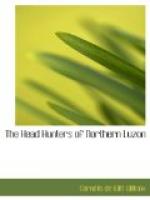not only the best, but indeed the only thing to do.
Here we had chow. We were now directly
on the left bank of the Chico, and, passing on, found
the country more open, and so better cultivated, the
paddies being broad, the retaining-walls low, and
the countryside generally wearing an air of peace
and affluence. This impression deepened as we
reached Bangad, extremely well situated on a tongue
running out at right angles to the main course of
hills. Here was a semblance of a street, following
the trail, or, rather, the trail, going through, had
followed the street. The houses were larger, cleaner,
better built; in short, substantial. One of them,
unfinished, gave us some idea of its construction:
floor sills on posts to ground; roof frame of planks,
1 x 6 inches, bent over to form the sides of the house
when completed, all hard wood, without a single nail,
the whole being held together by mortises and tenons
and other joints, accurately made and neatly fitted.
We remained here an hour or so, while the “Commission”
was making gifts to the people. No weapons whatever
were visible, and the women and children moved about
freely without a trace of shyness or fear. Our
way beyond the village now took us by many turns back
to the river, the trail finally rising in the side
of a vertical cliff, such that by leaning over a little
one could look past one’s stirrup straight down
to the water many hundreds of feet below. At
the highest point the trail turned sharp to the left,
almost back on itself. I am proud to say that
I rode it all, but was thankful when it was behind
us. Heiser’s horse this day got three of
his feet over the edge and rolled down eighty or ninety
feet, Heiser having jumped off in time to let his mount
go alone. It was fortunate for him that this
particular cliff was not the scene of this fall.
Some three miles farther, on fording a stream, we passed
from Bontok into Kalinga, and were met by Mr. Hale,
the Governor, with two warriors, tall and slender,
broad of chest and thin of flank, with red and yellow
gee-strings, tufts of brilliant feathers in their hair,
and highly polished head-axes on their hips. Greetings
over, we went on, and soon reached the river again,
going down the left bank until we came upon what seemed
to me to be a most interesting geological formation.
For the bank of the river here rose sharply in a rounded,
elongated mass, the end of which toward us was cut
off, as it were, just as one cuts off the end of a
loaf of bread, and showed alternate thin black and
white strata only three or four inches thick tilted
at an angle of sixty or seventy degrees and mounting
several hundred feet in the air. The trail itself
had been cut out in the side of the mass, and was
so narrow that not only was everyone ordered to dismount,
but the American horses were all unsaddled, the inch
or two so gained being important in passing along.
The black and white strata showing on the path, there
was an opportunity to examine them; the black layers




